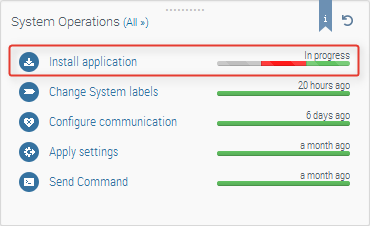How to upgrade firmware on gateways and routers?
You can upgrade the firmware on a single device or in bulk. The operation will handle the upgrade of the firmware as well as the radio module: if new radio module firmware is available, it is included with the ALEOS or AirLink OS firmware package.
Please watch this video tutorial for an overview.
Identify the Systems to Upgrade
Click on Monitor > Systems to view the list of your deployed AirLink routers. Then you will need to select one or several Systems from the list to be upgraded. As the firmware packages are specific per type of device, we advise that the selection contains devices of the same type. To this purpose, you can use the System type widget available in the dashboard carousel or the grid filter:

Then fine tune your selection by optionally applying additional filters (such as labels or firmware version) to the displayed systems:


Selecting the Desired Firmware
After having selected the systems for upgrade, click the Upgrade Firmware button ![]() in the grid menu. The Upgrade Firmware dialog box opens.
It displays the list of firmware already available in MyApp. These are the firmware that have already been used at least once within your company. Choose firmware package in the Firmware drop-down menu.
in the grid menu. The Upgrade Firmware dialog box opens.
It displays the list of firmware already available in MyApp. These are the firmware that have already been used at least once within your company. Choose firmware package in the Firmware drop-down menu.

If upgrading to a new version the very first time it may be necessary to click the magnifying glass icon to search for new firmware among the Public Apps. Note that once the firmware is selected, it will be copied to your company’s My Apps list and will be available from the pull-down list for the next use. To search for a firmware for a specific type of device, you can search by firmware Name and/or firmware Revision as shown below:

Upgrade Paths and Requirements
It may take multiple hops to get from your devices’ current firmware version to the target firmware version.
If you are upgrading a SINGLE device and if the upgrade violates the upgrade path, then the Upgrade Firmware button is disabled and an error message specifying the upgrade path appears. If the upgrade path is valid or if you are performing a FLEET UPGRADE, then the Upgrade Firmware button is enabled. If any devices in your Fleet Upgrade fail the upgrade path requirements, the failure will be noted in the Operations widget.
ALEOS Gateways and Routers
For LS300, ES400 and GX400/440 gateways running ALEOS 4.3.5 or earlier, refer to AirLink documentation Upgrading from older versions of ALEOS Firmware for more details. If you want to upgrade Verizon GX440 gateways, you may also be interested in these dedicated tools .
For RV50X, LX40, LX60, MP70 and RV55 routers, ALEOS 4.16.x.x is the required version before they can upgrade to a later release. For example, attempting to upgrade a router with firmware 4.13.1.1 to 4.17.1.1 will fail (AirVantage will block the upgrade). You must upgrade the router to 4.16.x.x first.
ALEOS Downgrade Information
Semtech always recommends updating ALEOS to the latest version to take advantage of new features and security updates. If your application requires you to install an earlier version of ALEOS than your current version, please note that Semtech:
- does not recommend using any version prior to ALEOS 4.9.3 for AirLink GX450 and ES450 routers.
- does not recommend using any version prior to ALEOS 4.13.0 for all other AirLink routers.
- recommends that ALEOS devices be reset to factory defaults following any downgrade operation.
To downgrade routers running ALEOS 4.18.0 (or later) to ALEOS 4.17.1 (or earlier) using ALMS, you must enable the setting Support Firmware Downgrade to Version Before 4.18.0. This setting is available under Services > ALMS > AirLink Management Service.

AirLink OS Routers
For routers running AirLink OS (such as XR60, XR80, XR90 and RX55), please note the following upgrade information.
- Routers running AirLink OS 2.0.43 or older must be upgraded to 3.0.35 before they can be upgraded further.
- Routers running AirLink OS 2.0.45 or newer must be upgraded to 4.0.x before they can be upgraded further (to 5.0.x, for example)
Examples:
- 2.0.43 > 5.0.49 will fail. Upgrade path is 2.0.43 > 3.0.35 > 4.0.x > 5.0.49
- 2.0.43 > 2.0.45 is OK
- 3.0.35 > 5.0.49 will fail. Upgrade path is 3.0.35 > 4.0.x > 5.0.49
- 3.0.35 > 3.1.x is OK
- 4.0.24 > 5.0.49 is OK
For more information, see the AirLink OS release notes on the Source .
Scheduling the Update
By default the firmware will be updated on the next connection from the device. As for any operation, you can schedule the upgrade for a specified future date and time. Refer to paragraph How to schedule an operation from How to use Operations?
Monitor Upgrade Success
System Operations widget in system grid gives a summary status of the upgrade operation just launched. If the operation is still in progress, the overall status will be In progress. Once terminated, you will get the date of termination.
For more information, click on the specific operation. It opens the operation details popup. From there, you can click on a specific system to view the different stepping stones of the firmware upgrade and/or the reason for error. You can also filter the result to spot the systems for which upgrade failed or the result for a specific system.
Once the operation is terminated, if some upgrades did not go through, you can use the Retry button that will relaunch the operation on all the systems for which it failed or was cancelled.

Note for NucALEOS Devices
Using ALMS to updgrade NucALEOS devices requires that the device(s) have static, publically routable IP addresses.
 Searching...
Searching...
